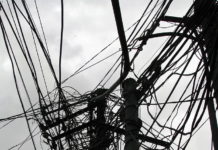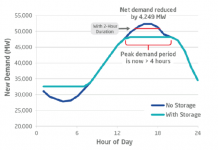This is the final article on the companies in the Wise Energy Use index. I believe that the current turmoil has given stock pickers an opportunity to buy well capitalized firms which make money by helping people save money on energy. The industry is poised to do well in hard financial times, but companies with weak balance sheets may not survive. In this series, I try to separate the wheat from the chaff. I generally liked the efficient lighting, smart metering and energy management, and global services companies in the index, but wasn’t thrilled by any of the electric vehicle picks.
Although the Smart Grid is something which is definitely necessary to use our electricity more wisely, it’s also something of a research project: we don’t really know what it’s going to look like when it gets here. What it does look like and which companies profit will be highly dependant on future regulation, so while many of the smart grid projects pursued by the following companies are quite admirable, I have to wonder if they will do much for any of the company’s bottom lines.
Duke Energy (NYSE:DUK). Duke has a current ratio of just over 1, which is lower than I would like with its cash from operations only about a quarter of its total debt, and a slightly negative levered free cash flow. However, since Duke is in part a regulated utility with very stable operations, a less solid balance sheet could potentially be tolerated, although I’d want to look deeper into the company’s structure to see just how this affects the riskiness of the company as a whole before investing. The pilot project in smart grid technology is interesting, but not much of a reason to invest.
Xcel Energy (NYSE:XEL). I’m very familiar with Xcel, which is my electric and gas utility in Colorado, as well as a company I deal with at the Colorado Public Utilities Commission (PUC). Because of my personal involvement as an expert witness in Demand Side Management cases for the Energy Efficiency Business Coalition, I believe that the current program the PUC adopted as a result affords Xcel the opportunity to slightly increase their profit margins by aggressively adopting energy efficiency, benefiting both Xcel and its customers. Therefore, I’m also a small shareholder (I consider the Smart Grid pilot in Boulder to be unlikely to affect the bottom line any time soon.) The company also leads the country for the amount of wind power delivered to customers. Although the current ratio is only 0.8, and operating cash flow is a fraction of total debt, as a regulated utility profits are relatively stable. I have also heard from company employees (water-cooler talk, essentially, but this could be confirmed by a review of company financial statements) that the company has been taking every opportunity they had over the last year to raise new debt financing, in anticipation of tightening credit markets.
Whirlpool Corp (NYSE:WHR). As a manufacturer of consumer durable goods, albeit appliances ready for the Smart Grid, Whirlpool’s revenues are likely to be hurt by an extended downturn. Therefore, although the current ratio is 1.2 and operating cash flow would cover the company’s entire debt in three years if it were not to decrease, I would still be uncomfortable holding this company.
Samsung Electronics. Samsung does not have a US listing, but Energy Tech Stocks chose to add it to the index because it’s looking into the same unpromising business of selling Smart Grid-enabled appliances to consumers as is Whirlpool. As I’m reluctant to invest in any company hoping to sell durable goods to consumers, I decided not to hunt down the financial statements in order to examine the company’s liquidity.
Freescale Semiconductor (NYSE:FSL). With a current ratio of about 3.5, and enough operating cash flow to cover all debt in a year, this company seems like a better bet to gain from putting chips in appliances than the appliance makers themselves, since each smart grid chip will be a new sale for Freescale, but simply replace another appliance sale for Whirlpool and Samsung.
DISCLOSURE: Tom Konrad owns XEL.
DISCLAIMER: The information and trades provided here are for informational purposes only and are not a solicitation to buy or sell any of these securities. Investing involves substantial risk and you should evaluate your own risk levels before you make any investment. Past results are not an indication of future performance. Please take the time to read the full disclaimer here.









Not enough credit is being given to the high gas prices this past year and it’s serious damage on our economy and society. That one factor alone has caused serious stress in both individuals and businesses. A record number of homes and jobs have been lost as a direct result. And, while we are doing the happy dance around the lower prices at the pumps OPEC is announcing cuts to manipulate the prices upward again. We must get on with becoming energy independent.We can’t take another year like this past. There is a wonderful new book out about the energy crisis and what it would take for America to become energy independent. It covers every aspect of oil, what it’s uses are besides gasoline, our reserves, our depletion of it. Every type of alternative energy is covered and it’s potential to replace oil. He even has proposed legislative agenda’s that would be necessary to implement these changes along with time frames. This book is profoundly informative and our country needs to become more informed and move forward with becoming energy independent. Green technology would not only provide clean cheap energy it would create millions of badly needed new jobs. The Book is called The Manhattan Project of 2009 Energy Independence NOW. Our politicians all need to read this book. http://www.themanhattanprojectof2009.com